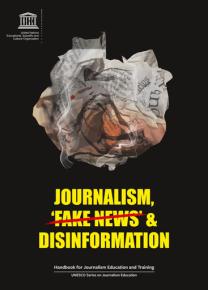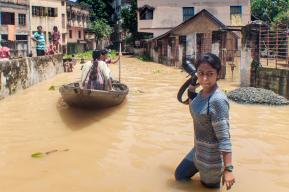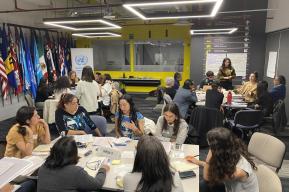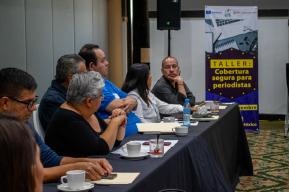
World Press Freedom Day
Journalism in the face of the Environmental Crisis
Between May 2 and 4, Chile and UNESCO will host the 31st World Press Freedom Day Conference.
World Press Freedom Day will be dedicated to the importance of journalism and freedom of expression in the context of the current global environmental crisis.
World Press Freedom Day 2024
A Press for the Planet: Journalism in the face of the Environmental Crisis
2-4 May 2024
Centro Cultural Gabriela Mistral, Santigo, Chile

This Story must be Told – UNESCO campaign for #WorldPressFreedomDay
All stories deserve to be told. But this one may be particularly decisive.
The climate and biodiversity crisis are not only affecting the environment and ecosystems but also the lives of billions of people around the world. Their stories of upheaval and loss deserve to be known and shared. They are not always pretty to watch. They can even be disturbing. But it's only by knowing that action is possible. Exposing the crisis is the first step to solving it.
That's why the role of journalists is crucial. It is through their work, their courage and their perseverance that we can know what is happening across the planet. They work on the frontlines of our collective fight for the health of our planet and our struggle for livable lives. On this World Press Freedom Day, let’s recognize and celebrate their work in helping us shape a better future.

Academic conference
If you are an academic interested in topics such as freedom of expression and safety of journalists, register to the Global Conference to attend the academic conference, which will take place on 4 May 2024.

Commemorations around the world
World Press Freedom Day is taking place on a global scale. Local, national and regional celebrations are organized by government and civil society organizations, including media, journalists' associations, universities, among others. If you are planning to organize an event in your country, please fill out the form below so it can be featured in UNESCO's list of commemorations around the world.

Dis and misinformation around the climate crisis
In the context of the world's triple planetary crisis (climate change, biodi-versity loss, and air pollution) dis- and misinformation campaigns challenge knowledge and scientific research methods. Attacks on the validity of science pose a serious threat to pluralistic and informed public debate. Indeed, misleading and false information about climate change can, in some cases, foster doubt and incredulity about environmental issues, their impact and urgency, and undermine international efforts to address them.
Dis- and misinformation about environmental issues can lead to a lack of public and political support for climate action, effective policies, and the protection of vulnerable communities affected by climate change, as well as of women and girls, as climate change tends to exacerbate existing inequalities.
To address this flood of disinformation in the digital ecosystem, UNESCO launched in November 2023 the Guidelines for the governance of digital platforms. If implemented in their entirety, the Guidelines will empower all relevant stakeholders to put in place a governance system that can foster freedom of expression while tackling the negative externalities.
Get Involved
3 May acts as a reminder to governments of the need to respect their commitment to press freedom and is also a day of reflection among media professionals about issues of press freedom and professional ethics. Just as importantly, World Press Freedom Day is a day of support for media which are targets for the restraint, or abolition, of press freedom. It is also a day of remembrance for those journalists who lost their lives in the pursuit of a story.
History of the International Day
Every year, 3 May is a date which celebrates the fundamental principles of press freedom, to evaluate press freedom around the world, to defend the media from attacks on their independence and to pay tribute to journalists who have lost their lives in the exercise of their profession. World Press Freedom Day was proclaimed by the UN General Assembly in 1993 following a Recommendation adopted at the twenty-sixth session of UNESCO's General Conference in 1991. This in turn was a response to a call by African journalists who in 1991 produced the landmark Windhoek Declaration.
News
The Santiago Declaration
The historic Santiago Declaration was adopted during the “Seminar on the Development of Media and Democracy in Latin America and the Caribbean” (May 6, 1994). It marked a new phase in promoting the right to freedom of expression and of the press, as well as the development and recognition of community media, independence, and pluralism of the media in Latin America and the Caribbean.

The Windhoek Declaration
The Windhoek Declaration is considered a benchmark for ensuring press freedom around the world. It all began at a seminar in Windhoek, Namibia in 1991.













